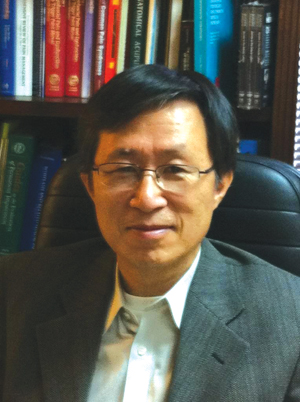By Jason Cruz
Northwest Asian Weekly

Dr. Chang B. Shin
Dr. Chang Shin has a basic philosophy that drives his dedication to serving others. “After age 50, you have learned something from society and you should try to return it.” Since 2008, the 56-year-old physician has been running a free medical clinic offering services to low-income and underserved members of the Korean community.
Shin is one of the healthcare professionals being honored at the Northwest Asian Weekly Foundation’s Annual Asian American Pioneers in Healthcare on Oct 1.
The Saturday Free Clinic, also known as the Cornerstone Clinic, is held during the first and third Saturday of each month out of Shin’s office in Renton. This past spring, the program expanded its clinical space and added staff to accommodate the expanding number of patients.
The clinic offers general medical care to those in need. It serves those without health insurance and other means to see a doctor. The clinic offers its services to everyone, although most patients are from the Korean community. Most patients hear of the clinic by word of mouth.
When Shin first started the clinic, they saw three to five patients per month. The clinic now sees 40 to 45 patients a month. In addition, staff has increased to serve a greater variety of health concerns. Shin has added 11 volunteer medical professionals, including nurses, and secretarial and student helpers. According to Shin, the basic premise of the clinic is “a more integrative approach to medicine.” The medical staff includes a psychiatrist, chiropractor, naturopath, pain specialist, podiatrist, an acupuncturist, and a rehabilitation doctor.
Born in Pusan, South Korea, Shin studied pre-law in Seoul. However, he realized that he could serve others more effectively in other ways. “I feel like there are limitations in law,” Shin added, “I felt I could serve [people] in a different way and be more balanced myself.” Shin explained that he wanted to balance Eastern and Western philosophies in his work.
Shin abandoned his focus in law to go to the United States and study experimental psychology. He obtained a master’s degree at Western Illinois University. Even with his new area of focus, Shin found obstacles. Shin applied for entry into the clinical psychology program but was told that his language skills were not sufficient for the program. Essentially, he was told that he did not speak English well enough to participate.
“I was crushed inside and decided that I’d rather go into medicine,” said Shin. As a result, he went to medical school in Texas and decided to focus on the study of pain management.
Shin’s focus is in neurology, the study of the nervous system. He focuses on how the nerves and brain deal with pain. Through his study, he determines ways that his patients may deal with pain. He believes in an “integrative approach” to handling pain. This includes the use of Eastern methods of treatment such as acupuncture.
During his medical residency, Shin came to Seattle for a conference and immediately fell in love with the city. “I was fascinated by Seattle.” The climate, mountains, and water reminded him of home in Pusan.
Shin returned to Seattle in May 1999 to start his own practice. Staying true to his philosophy of balancing treating methods from Eastern and Western cultures, Shin has included alternative medicine as a part of his medical practice. Recently, Shin hired a naturopath and an acupuncturist to see patients.
The free clinic operates solely through volunteers and depends on private donations to pay for supplies and office equipment. Most donations come through fundraisers. Shin stated that a golf tournament held during the spring raised $3,000 for the clinic. In addition, a concert that was held this summer garnered another $5,000. Shin is in the process of organizing a nonprofit organization and appointing board members to assist in managing the clinic.
Shin spends an extra 10 hours a week on managing the free clinic. He sees the clinic “expanding and experimenting” in the future. Shin would like to connect with other minority groups and expand hours of operation that may include holding the clinic more than just twice a month. He also realizes that the clinic may need to find qualified interpreters, as language may be a barrier in helping underprivileged communities. ♦
Jason Cruz can be reached at info@nwasianweekly.com.



